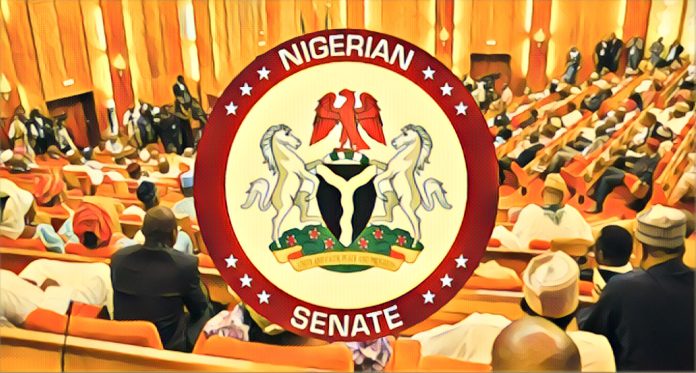The Nigerian Senate has taken significant steps towards barring the governor of the Central Bank of Nigeria (CBN) and deputy governors of the apex bank from participating in politics. Both bills, aimed at preventing CBN leaders from entering politics, passed their second reading during a recent session in the upper chamber.
This development follows an incident 17 months ago when the former CBN governor, Godwin Emefiele, garnered negative attention for accepting N100 million worth of presidential nomination and expression of interest forms from the ruling All Progressives Congress (APC), allegedly funded by a group of rice farmers.
Section 9 of the CBN Act, 2007, explicitly states that the CBN governor must refrain from engaging in any other vocation while in office and should resign in writing to the President if contemplating such a move. Despite public outcry at the time, Emefiele retained his position until the end of his tenure when President Bola Tinubu took office.
In the recent Senate session, lawmakers passed the bills proposed by Sunday Karimi (APC, Kogi) and Darlington Nwokocha (LP, Abia) after debating the issue. The proposed amendments aim to further insulate CBN leaders from political involvement while in service. Additionally, the bills suggest the inclusion of the Auditor-General of the Federation, Chairpersons of the Federal Inland Revenue Service (FIRS), and Chartered Institute of Bankers in Nigeria (CIBN) on the CBN’s board. Senator Adams Oshiomhole (APC, Edo) opposed the bills, contending that Emefiele’s case was a consequence of governance issues and a lack of will to enforce existing laws.
Karimi, explaining his bill’s motivation, emphasized that these legislative changes would enhance transparency and accountability within the CBN’s operations. He also proposed an amendment to Section 20 of the CBN Act, prohibiting the use of foreign currency in local transactions in Nigeria.
Deputy Senate President Jibrin Barau, presiding over the session, instructed the Senate Committee on Banking and Finance to report back on the CBN Amendment Bill within two weeks.
In related news, President Tinubu is expected to present the proposed N26.1 trillion 2024 budget to a joint session of the National Assembly in three weeks. The Senate’s Committee on Appropriations has summoned the Minister of Finance, Wale Edun, and the Minister of Budget and Economic Planning, Atiku Bagudu, to appear before it next Wednesday for explanations regarding the budget. The committee aims to allocate a higher percentage of the budget to capital expenditure and maintain the January-to-December budget cycle.
Furthermore, a bill to amend the Cyber Crimes Act of 2015 has passed its second reading in the Senate. The bill, sponsored by Senator Shehu Buba (PDP, Bauchi), seeks to correct errors in the principal Act and empower the National Security Adviser (NSA) to monitor compliance with its provisions. It addresses issues related to cybercrimes, internet-based fraud, hacking, and privacy infringements. The bill is intended to update and enhance legislation to address the challenges posed by digital and information technology crimes.
After discussions and contributions from senators, Deputy President of the Senate Jibrin received approval to refer the bill to the Committee on National Intelligence and Security.
Source: [The Guardian]



